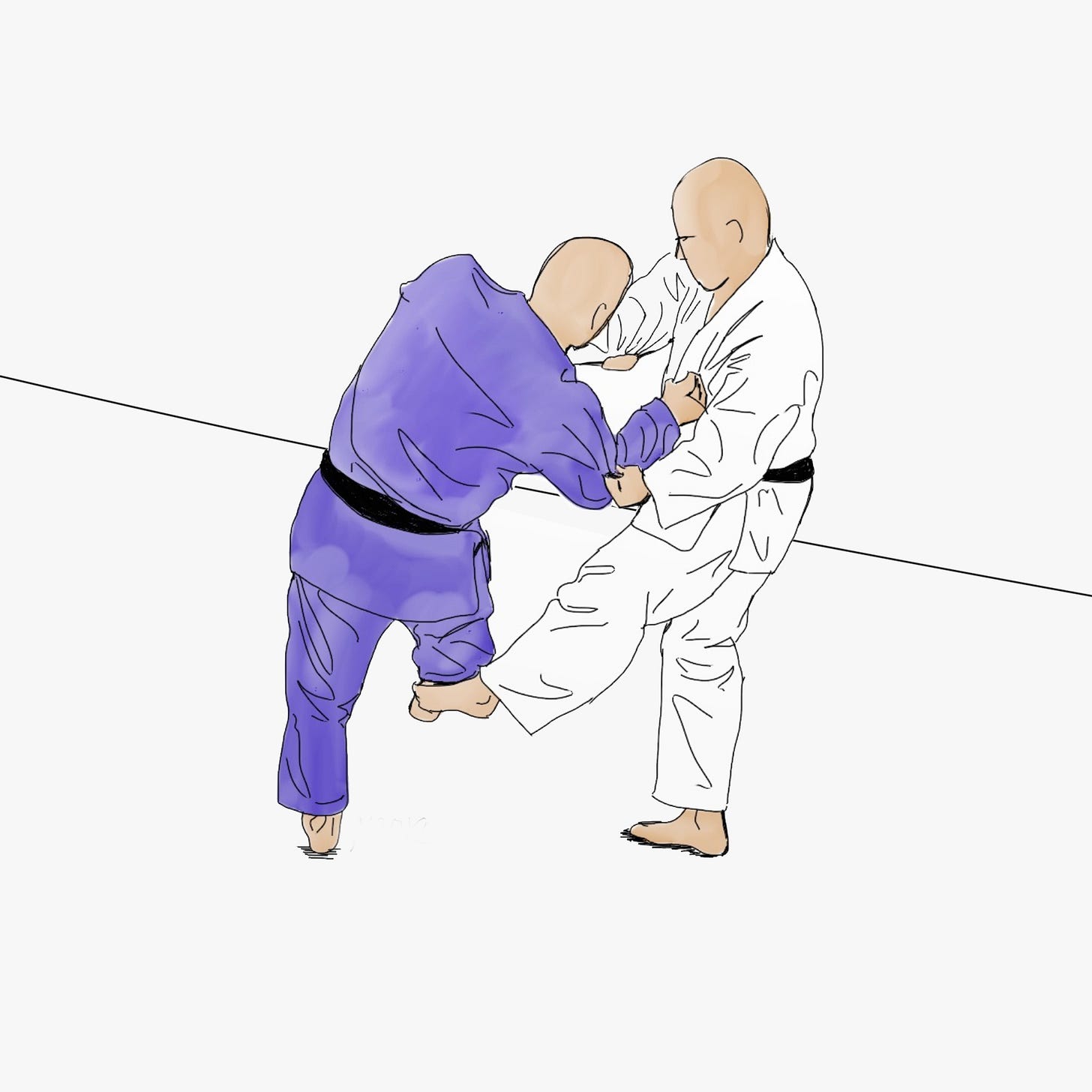The Power of Acceptance
How Letting Go Can Propel Your Startup Journey
I'm Manuel Saez, I write to help founders master emotional intelligence to make decisions with clarity 🌻 EQ coach, 2X-founder & award-winning designer ➜ I love fixing old motorcycles 🛵 🏍
Reading time: 7 min.
Contents:
How Acceptance Works
Acceptance is Not Quitting or Giving Up
Why Acceptance is Hard for People
The Energy Shift of Acceptance
Takeaways
My Dad once taught me "de-ashi-harai," a judo move that uses the opponent's force to my benefit. When we practiced, I was amazed that I could easily take bigger opponents and knock them down.
Acceptance is a bit like de-ashi-harai. You don't fight the problems that come to you head-on; you use acceptance to remove their power.
Manuel,
Sometimes, you push so hard against your problems that you don't see the simple path forward.
Sometimes, when things don't go your way, you get angry and resentful, and your life becomes a vicious circle of negativity and disappointment.
The funny thing is that the moment you let go and accept your present circumstances, things start happening for you.
If you catch yourself in this situation again, think about acceptance.
How Acceptance Works
You have plans. Tomorrow, you are going to do fun things. You are meeting with a friend to go to the beach. Yay, this is going to be great.
You wake up to a rainy day. It seems like one of those gray, cloudy days with a continuous and relentless pour.
You feel resentful that it is raining, you want to have fun with your friends, and now you can't.
You are angry. You had everything planned, and now it's not going to happen. I hate this rain, you say.
After venting your disappointment, you look out the window and realize that sometimes, things happen that are beyond your control.
You take three big breaths and think about the power of acceptance.
You accept that today will not be sunny; that is okay. There will be other times to go to the beach and do fun things in the sun.
As you look outside, you realize that rain is beautiful and good.
The smell of wet dirt reminds you of warm childhood memories of camping, being protected under the tent, falling asleep, and hearing the noise of the droplets on the tarp.
Suddenly, you feel the need to go outside in the rain.
You walk under the water and get wet, but it does not matter. The water feels refreshing; it is not cold; it is just the right temperature.
As you walk around, you find other people also enjoying the rain. They are having fun running through puddles and splashing water at one another.
They are your friends. Since they can't go to the beach, they play outside. They are having fun and are calling you to join them.
You join them and spend time playing with them, happy.
Later that day, you realize that you found joy in something you did not want earlier—today was a great day, after all. Acceptance allowed you to see the joy in something you initially thought ruined your day.
Acceptance works by allowing you to acknowledge and embrace your current circumstances without resistance. When you stop fighting against what is happening and accept the reality of the situation, you create mental space to see new possibilities and solutions.
This change in perspective can transform frustration into understanding. You feel peace and harmony inside, turning obstacles into opportunities.
Acceptance is not about giving up; it's about letting go of the need for control and finding peace with what is so you can move forward with clarity.
Acceptance is Not Quitting or Giving Up
Some people confuse acceptance with quitting or giving up. Quitting means that you've stopped trying, abandoning your goals and dreams.
Acceptance, on the other hand, is about acknowledging reality and adapting to it. It's about understanding that some things are beyond your control and finding a way to work with them instead of against them.
When you accept a situation, you're not saying you're okay with it or won't try to change it. You're simply recognizing it for what it is.
This clarity can free you from frustration, negativity, and wasted effort, allowing you to redirect your energy toward more productive actions.
It's about using your opponent's force to your benefit, like in judo, where you leverage their strength to your advantage.
By accepting your circumstances, you can identify what you can and can't control so you can make better decisions, focus on actionable steps, and remain positive in the face of adversity.
Acceptance provides the foundation for growth and change, showing you that adapting isn't giving up. It's a strategic move to keep going; think of it as a "pivot'. It empowers you to find new paths and continue your journey with more determination and insight.
Why Acceptance is Hard for People
Acceptance requires letting go of control and confronting uncomfortable truths, which requires high awareness and emotional intelligence.
Humans often want to control our surroundings and outcomes, believing our efforts alone can shape our reality. When things don't go as planned, it's natural to feel frustrated, disappointed, or angry.
Accepting a situation means admitting that our power is limited and some factors are beyond our influence.
Another reason acceptance is challenging is that it forces us to face our vulnerabilities and insecurities. When we accept a difficult reality, we must confront our fears and doubts, which can be uncomfortable and unsettling.
This process often involves a sense of loss, whether it's the loss of a dream, a plan, or an expectation.
In the startup world, hustle culture can make acceptance difficult. The relentless drive for success and the "never give up" mentality are often seen as essential traits for entrepreneurs.
This mindset values perseverance and resilience but can also equate acceptance with weakness or failure. For founders, admitting that a product isn't working or a strategy needs to change can feel like defeat.
The line between tenacity and stubbornness is often blurred. The pressure to keep pushing forward, no matter what creates internal conflict. It's hard to distinguish between giving up and making a smart, strategic pivot.
Learning to accept reality and adjust your approach is a mark of a seasoned entrepreneur. It's about recognizing when to change course to avoid wasting time, energy, and resources on a path that isn't viable.
Lastly, acceptance requires patience and emotional maturity. It involves pausing, reflecting, and understanding our emotions and reactions. This level of self-awareness and emotional regulation takes practice and time, which is why acceptance can be a significant personal challenge.
The Energy Shift of Acceptance
One thing I've noticed in my experience with acceptance is the change in energy I feel.
When I'm forcing and fighting against the circumstances, I feel anxious, angry, and overwhelmed with bad vibes. It's like being stuck in a storm, where every effort to move forward only adds to the chaos. This resistance drains my energy and clouds my judgment, making it harder to see any path forward.
But when I accept the situation, it feels like the clouds part, and the sun comes out. There's a noticeable shift in my vibe. The tension eases, and I find a sense of calm and clarity.
Acceptance doesn't mean I stop caring or trying; it means I stop wasting energy on what I can't control. This shift allows me to focus on what I can do, opening up new possibilities and solutions I couldn't see before.
I don't know how or why this happens, but my theory is that this energy shift occurs because everything in the universe has vibrations, including our thoughts and emotions.
When we resist and fight against circumstances, we emit negative vibrations, which attract more negativity. Acceptance, however, aligns us with positive vibrations, creating a sense of harmony and balance.
This change in our internal state influences our external reality, helping us to see opportunities and solutions more clearly. By accepting, we tune into the natural flow of the universe, which supports our growth and well-being.
Takeaways
Acceptance has been a powerful tool (like a judo move) in my journey as a founder and in life. It's not about giving up; it's about seeing things as they are, letting go and adapting.
When I fought against my problems, I felt stuck and drained. But when I accepted reality, I found new paths and solutions I couldn't see before.
Like the rainy day that became a fun adventure with friends, acceptance can turn challenges into opportunities.
I leave you with three takeaways to remember:
Use the Situation: Like in judo, use what's happening to your advantage.
Let Go of Control: Focus on what you can change, not what you can't.
Stay Positive: Acceptance brings clarity and peace, helping you see new possibilities.
Remember, acceptance isn't a weakness. It's a smart move that helps you grow and succeed.
Manuel Saez





